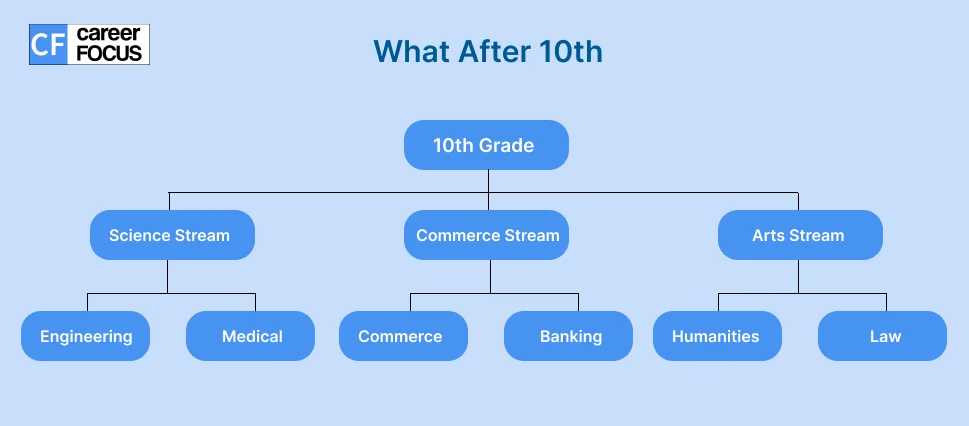Table of Contents
Completing the 10th standard is a major milestone in a student’s life. It’s the moment when the first big academic decision must be made, and the choices made at this stage can shape the rest of a student’s academic and career journey. Career guidance after 10th is essential to ensure that students are well-informed, confident, and ready to take the next step toward their goals.
In India, the transition from the 10th to the 11th standard involves selecting a stream—Science, Commerce, or Arts. This decision is crucial as it lays the foundation for future academic choices, competitive exams, and career opportunities. Having the right guidance ensures that students don’t make hasty or uninformed decisions.
Why Career Guidance After 10th is Important
The choices made after the 10th standard are critical because they influence higher education, career paths, and future job opportunities. Here are key reasons why career guidance after 10th is so important:
- Stream Selection: The decision between Science, Commerce, and Arts can be overwhelming. Career guidance helps students understand which stream aligns with their interests and long-term career goals.
- Exploring Career Options: Many students may not have a clear idea of the career opportunities that different streams offer. Career guidance provides insight into various professions and the educational paths needed to pursue them.
- Preventing Career Mismatch: Without proper guidance, students may select a stream that does not suit their interests or skills, leading to dissatisfaction later on. Career counselling helps avoid this mismatch by aligning the student’s choice with their abilities and passions.
The Role of Career Counsellors in Guiding 10th Standard Students
Career counsellors offer essential support at this stage by helping students assess their strengths and interests while navigating their academic choices. Here’s how they assist:
1. Stream Selection Based on Strengths and Interests
Choosing the right stream is one of the most important decisions after the 10th. A career counsellor helps students by conducting aptitude tests and interest assessments to determine their strengths. Based on the results, they can advise students on which stream will be most suitable for their abilities and career aspirations.
2. Providing Information on Career Paths
Once a student selects a stream, they should understand the various career options available within that stream. Career counsellors provide detailed insights into different professions—be it in engineering, medicine, business, law, or the arts. This exposure helps students make informed choices about their future careers and education.
3. Guiding Through Entrance Exams and Competitive Tests
For students who choose Science, especially those aspiring for engineering, medical, or other technical fields, preparing for entrance exams like JEE or NEET is essential. Career counsellors help students create a study plan, identify coaching institutes if needed, and prepare mentally for the competitive nature of these exams.
Key Streams and Their Career Opportunities
1. Science Stream
The Science stream is popular among students who are interested in fields like engineering, medicine, technology, and research. This stream offers a wide variety of career options, including:
- Engineering: With specializations like computer science, mechanical, civil, and electrical engineering, students can pursue careers in various industries.
- Medicine: Aspiring doctors and healthcare professionals choose this path, which involves clearing entrance exams like NEET to enter medical colleges.
- Research and Development: Those interested in exploring scientific innovations and research can pursue careers in this field through degrees in physics, chemistry, biology, or applied sciences.
2. Commerce Stream
For students interested in business, finance, economics, or management, the Commerce stream provides numerous opportunities. Popular career paths include:
- Chartered Accountancy (CA): A challenging but rewarding career in finance and accounting that requires dedication and passing the CA exams.
- Business Administration and Management: Students can pursue courses like BBA, followed by an MBA, leading to roles in management, marketing, or entrepreneurship.
- Economics: Those with an interest in economic theory and policy can explore careers in research, teaching, and consulting after completing degrees in economics.
3. Arts Stream
The Arts stream offers a wide range of career options in fields such as media, education, social work, and more. Some popular career choices include:
- Media and Communication: Students can pursue careers in journalism, advertising, film, and content creation by studying mass communication.
- Civil Services: For those aspiring to enter the Indian Administrative Service (IAS) or other government roles, the Arts stream offers a solid foundation in subjects like political science, history, and sociology.
- Psychology and Social Work: Careers in counselling, mental health, and social work are ideal for students who choose psychology or social work as their area of focus.
How to Choose the Right Stream After 10th
Making the right choice after the 10th requires careful consideration. Here are the key factors to consider:
1. Assess Your Interests and Strengths
The first step is self-reflection. What subjects do you enjoy? Are you passionate about science and problem-solving, or do you have a knack for understanding economics and business concepts? Understanding your strengths and interests will make the stream selection easier.
2. Research Career Options
Students should research different career paths within each stream. This includes understanding what subjects they will study, the courses they need to pursue after 12th, and the type of jobs available in each field.
3. Seek Career Counselling
Career counselling helps students explore all possible options without bias. Through professional guidance, students can avoid misconceptions and gain clarity about their future.
4. Understand the Long-Term Impact
When choosing a stream, think about the long-term prospects. Consider job stability, growth opportunities, and how the career aligns with your personal interests and lifestyle goals. Some professions may require years of education and training, while others may offer quicker entry into the workforce.
Benefits of Career Guidance After 10th for Students and Parents
1. Informed Decision-Making
With the vast number of options available, students often feel overwhelmed. Career guidance simplifies the process by offering clarity and helping students make informed choices.
2. Personalized Guidance
Career counsellors provide tailored advice based on the student’s aptitude and career aspirations. This personalized approach ensures that students are on the right track and make choices that suit their individual needs.
3. Parental Involvement
In India, parents often play a significant role in their children’s career decisions. Career guidance involves parents in the process, ensuring that they understand the student’s potential and future opportunities. This creates a supportive environment for the student to thrive.
Conclusion
Career guidance after 10th is the key to unlocking a student’s future potential. By helping them make informed decisions about stream selection, career options, and academic planning, career counsellors provide students with the tools they need to succeed. For parents and students alike, career guidance offers clarity, reduces confusion, and ensures that the choices made at this crucial stage lead to a bright and fulfilling future.
Choosing the right stream after the 10th may seem daunting, but with the right guidance and support, students can confidently take the next step in their academic and career journey.



2 comments
is it good to take Career guidance before 10th std??
Yes, taking career guidance before 10th is beneficial as it helps in choosing the right subjects, prevents last-minute confusion, and aligns career choices with personal interests. Early guidance boosts self-awareness, reduces peer pressure, and increases academic focus. The best time for career counseling is between 8th and 10th grade.